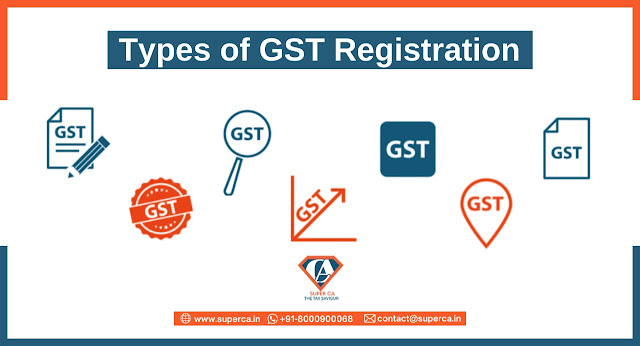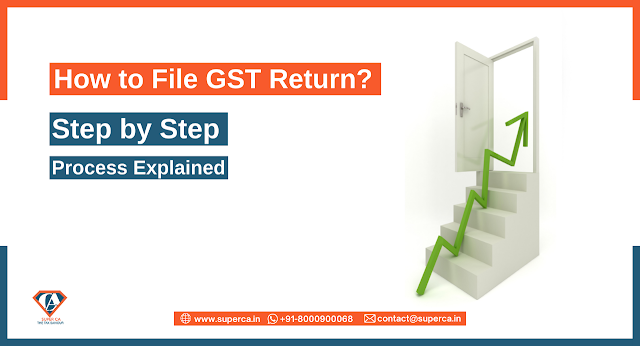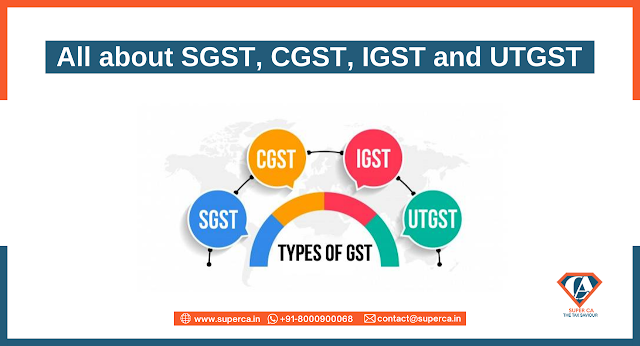Types of GST Registration
GST Registration is a process for applying for a unique GSTIN i.e. GST Identification Number on the GST Portal. The taxpayer requires GSTIN to collect and pay GST on the outward supplies i.e. sales and claim GST input tax credit on the inward supplies i.e. purchases.
As per the GST rules, it is compulsory for a business/supplier that has a turnover of above Rs.40 lakhs (Rs 10 lakhs for special category states present in hill states and North-Eastern states) to register as a normal taxable entity. Also, there are various types of GST Registrations described under the GST Act. Types of GST Registration depends on the nature of the business. Undergoing the registration procedure is difficult without recognising its different forms. That’s why it is necessary that we should be aware of the different types of GST Registration & acquire a better idea regarding the types before selecting the suitable one.
Normal Taxpayer
As per the GST rules, when the Threshold limit of Rs.40 lakhs (Rs 10 lakhs for special category states present in hill states and North-Eastern states) is crossed, it is compulsory for a business/supplier to get registered under GST
The taxpayers registered under the regular scheme have to file returns monthly. Regular taxpayers can avail of an input tax credit of GST paid on the purchase of goods or services or both.
A large number of businesses in India fall under this category. There is also no expiry date for taxpayers who fall under this category. It is easier and simpler for them to pay taxes as they do not have any deposit fees or expiration dates on their fines. Additionally, the central government allows them access to unlimited validity of input tax credit.
Casual Taxable Individual :
Individuals who wish to set up an occasional/seasonal shop i.e they do not have a fixed place of business can opt for this category of registration.
An advance must have to be deposited equal to the amount that is equal to the expected GST liability during the time the seasonal shop/business is operational. The duration of the GST Registration under this category is 3 months and it can be extended or renewed.
Composition Taxpayer:
Apply for this if you wish to obtain the GST Composition Scheme. The composition scheme has lesser compliance compared to other types. Also, it has limited tax liability and high liquidity as taxes are at a lower rate. Small taxpayers may find this trade-off worth it and pay a set rate of turnover instead.
In this case, businesses need to deposit a fixed yearly payment irrespective of their actual earnings. They will not be able to claim an Input Tax credit under this category. The composition scheme is currently applicable to businesses with an annual aggregate turnover of Rs. 1.5 crores or less (lower limit is applicable in case of special category states)
Non-Resident Taxable Individual:
The Non-resident taxable person is any person who occasionally undertakes transactions involving the supply of goods/services, whether as principal or agent or in any other capacity, but who resides outside India and has no fixed place of business or residence in India.
Similar to the Casual Taxable Individual type, they must pay a deposit equal to the expected GST liability during the time the GST registration is active.
All non-resident taxable persons are required to obtain GST registration in India, irrespective of aggregate annual turnover or any other criteria. Further, the GST Act and Rules specify that all non-resident taxable persons must obtain GST registration 5 days prior to the commencement of business. Hence, it is important for foreign businesses supplying goods and services to India to obtain GST Registration at the earliest. The normal tenure is usually 3 months, but it can be extended or renewed by the taxpayer.
Input Service Distributor (ISD)
It is an office of the supplier of goods/services which receives tax invoices on receipt of input services and issues tax invoices for the purpose of distributing the credit of CGST/SGST/IGST paid on the said services to your branch with the same PAN. He/She must be a supplier of taxable goods /services having the same PAN as that of the office referred.
Non-Resident Online Service Distributor
The supplier of online information and database access or retrieval services from a place outside India to a person in India, other than the registered person, is required to register in GST as a provider of OIDAR Services. Such a Non-Resident Online Service Provider needs to appoint an Indian Authorised Signatory possessing a valid PAN.
Individuals notified by the UN Embassy/ Body/ Other persons
Unique Identity Number (UIN) is granted to UN Bodies and Embassies on the basis of a letter issued by the Ministry of External Affairs (MEA). It enables the UN Bodies, Embassies and Other Notified Persons to get the supplies of taxable goods /services from the registered people.
The UIN is mentioned on every purchase invoice and that particular UIN holder can claim a refund of GST paid on such transactions on the basis of Form RFD -10, which is generated after their filing Statement of such inward supplies in Form GSTR-11.
Special Economic Zone (SEZ) Developer/ Unit
A special economic zone (SEZ) is a dedicated zone wherein businesses enjoy simpler tax and easier legal compliances. SEZs are located within a country’s national borders, but however, they are treated as a foreign territory for tax purposes. Their main motives include the increase of trade balance, employment, an increase of investment, job opportunities and effective administration.
Every person having a unit in a Special Economic Zone or being a Special Economic Zone developer will have to apply for fresh registration under the GST regime, as distinct from his place of business located outside the Special Economic Zone in the same State or Union territory.
Tax Deductor at Source (TDS) /Tax Collector at Source (TCS)
TDS stands for Tax Deducted at Source (TDS). All Government undertakings, Local Authorities and other notified entities making contractual payments in excess of INR 2.5 Lakhs to suppliers need to register as a TDS under GST. While making such payment in excess of INR 2.5 Lakhs, the concerned Government undertakings, Local Authorities and other notified entities need to deduct 1% under CGST Act and 1% under SGST Act; In case of inter-state transactions, 2% (under IGST Act) of the total payable amount and remit it into the appropriate GST account. The credit of such GST payments will be provided to the suppliers.
On the other hand, TCS stands for Tax Collected at the source. TCS under the GST regime means the tax collected by an e-commerce operator from the consideration received by it on behalf of the supplier of goods/services who makes supplies through the operator’s online platform.
Operators who own or operate or manage e-commerce platforms are required to collect TCS. TCS applies only if the operators collect the consideration from the customers on behalf of vendors or suppliers. Operators need to collect 1% under CGST Act and 1% under SGST Act; In the case of inter-state transactions, 2% (under the IGST Act) on the net values of taxable supplies made through the e-commerce operator.





Comments
Post a Comment